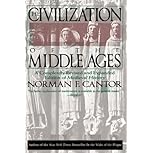


in 1957 at Princeton, where he started his teaching career.Includes bibliographical references and index degree from Princeton in 1953, spent a year as a Rhodes scholar at Oxford and got his Ph.D. Norman Cantor was born in Winnipeg, Canada, and graduated from the University of Manitoba in 1951, the year he came to the United States. Just before his death, he finished "Alexander the Great," a concise profile of the conqueror's life and his influence on the ancient world, which HarperCollins has on its schedule for 2005. Cantor's latest book, published in April, was "The Last Knight: The Twilight of the Middle Ages and the Birth of the Modern Era" (Free Press). "Inventing Norman Cantor: Memoirs of a Medievalist" was published by the Arizona Center for Medieval and Renaissance Studies in 2002. He was the editor of the Encyclopedia of the Middle Ages (Viking, 1999) and a companion volume tailored for young readers from Penguin Putnam Books. Cantor used case studies to illuminate the social, political and economic upheavals that reshaped views on philosophy, religion and the arts and, doing so, pointed the Continent toward its Renaissance. Its subject was the 14th-century equivalent of nuclear devastation, with a third of Europe's population killed and every aspect of its civilization upended. "Inventing the Middle Ages" (William Morrow, 1991) was a historiography documenting how present views of the period took hold.Īnother recent book in print is "In the Wake of the Plague: The Black Death and the World It Made" (Free Press, 2002).


 0 kommentar(er)
0 kommentar(er)
